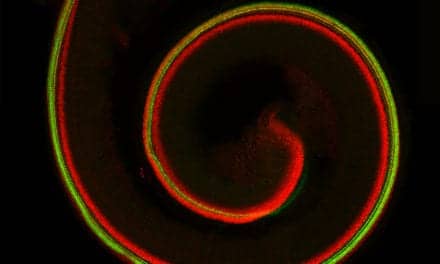Auris Medical, Basel, Switzerland, has announced positive results from the TACTT11 study, its second phase II clinical trial with AM-101 for the treatment of acute peripheral tinnitus. The company states that the study provided further evidence for the safety and efficacy of the treatment and supports the conduct of phase III confirmatory studies.
Based on research conducted at the INSERM Institute for Neurosciences of Montpellier, France, AM-101 is a small molecule N-methyl-D-aspartate (NMDA) receptor antagonist formulated in a biocompatible gel for intratympanic injection. Emerging evidence suggests that NMDA receptors in the cochlea play a major role in the occurrence of tinnitus following inner ear excitotoxicity, which is characterized by excessive synaptic release of glutamate—the principal neurotransmitter in the auditory system. Cochlear excitotoxicity may be triggered by, for example, trauma (eg, exposure to excessive noise), neuroinflammation, disturbances in inner ear blood supply (anoxia/ischemia), or the administration of certain ototoxic drugs. It has been proposed that the upregulation of NMDA receptors induced by cochlear excitotoxicity is responsible for aberrant excitation of auditory nerve fibres, which is perceived as tinnitus.
The clinical development of AM-101 was initiated by Auris Medical in 2007. Patents have been granted in more than 30 countries worldwide to date.
Second phase II clinical trial results. According to Auris Medical, the randomized, placebo-controlled, double-blind study was conducted in the United States, Belgium, Germany, and Poland. It enrolled patients suffering from tinnitus following traumatic injury to the cochlea (acute noise trauma, inner ear barotrauma, middle ear surgery) or otitis media up to 3 months after tinnitus onset. A total of 85 patients were randomized to receive AM-101 at 0.81 mg/mL or placebo by way of intratympanic injection either in a single dose (stage 1 of the trial) or in three doses over two weeks (stage 2). Following treatment, study participants were observed for 90 days.
Preliminary results from the TACTT1 study show that both single and triple dose treatments with AM-101 were well tolerated. Occurrence of adverse events or clinically relevant hearing loss overall was low to moderate with no statistically significant differences between treatment groups and dose regimens. As in the previous studies with AM-101, most adverse events were mild or moderate in intensity and represented transient local effects of the injection procedure. At <0.2 ng/mL, the concentrations of AM-101’s active substance and primary metabolite in blood plasma were close to the analytical limits of quantification, thus confirming the minimal systemic exposure offered by the intratympanic approach.
In addition, reports the company, the TACTT1 trial showed a clear trend for superior improvement in AM-101 treated study participants over placebo groups with regard to subjective tinnitus loudness, annoyance, sleep difficulties, tinnitus handicap/impact, and tinnitus severity. Although the study was not powered to demonstrate statistical significance between treatment groups, the difference between active and placebo groups was significant for several efficacy outcomes.
The results were also broadly in line with the trends observed in the previous phase II trial with AM-101. The primary endpoint—the change in tinnitus loudness from baseline to the last follow-up visit—did not show any statistically significant difference between dose regimens.
“We are very pleased with the positive outcomes from this second phase II study with AM-101,” said Auris Medical founder and Managing Director Thomas Meyer. “They corroborate and complement the promising results from our previous trials and provide strong support for our planned phase III confirmatory studies…The almost 900 intratympanic injections that have been performed in our clinical development program so far helped us gain valuable insights into the nature and size of treatment responses at different concentrations, under different dose regimens, and for tinnitus with different origins.”
What’s next? These insights together with outcomes from discussions with regulatory agencies will be reflected in the design for the phase III trials expected to start later this year.
Source: Auris Medical




